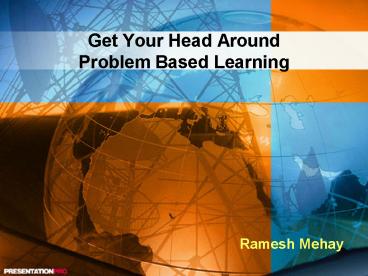Get Your Head Around Problem Based Learning - PowerPoint PPT Presentation
1 / 21
Title: Get Your Head Around Problem Based Learning
1
Get Your Head Around Problem Based Learning
- Ramesh Mehay
2
PBL Aims of this Session
- What is It?
- What Is it For?
- What do you need
- Adv vs Disadv
- Have a go
- What do you think?
- Further information
3
Sophie could remember times when the teachers or
her mother had tried to teach her things she
hadnt been receptive to.
4
And whenever she had really learned something, it
was when she had somehow contributed to it
herself.Jostein Gaarder. Sophies World
5
Lecture (leccharn.)
- Process by which the notes of a speaker become
the notes of a student without passing through
the minds of either. - Academic period set aside for rest and recovery
6
The most important phrase in education is
- I dont know .
7
PBL
What is it?
- uses problems or cases
- to identify learning issues.
8
PBL. The process
- The Case / problem
- Discussion
- Identify learning issues
- Reflection
- Individual study Group study
- Review
- Discussion/mini-presentations
- ?More learning issues
9
The Problem/Case
Dolomans 1997, Effective Case Design, Medical
Teacher
- Registrars prior knowledge
- Contain cues
- Relevant context
- Integrate basic science concepts
- Interest, Discussion
- Self-directed learning.
- Learning objectives.
10
So What DO You Need?
3 things
- A Facilitator
- A Problem
- A Group
11
The group
- Should understand principles of PBL
- Appoint a reader
- Appoint a scribe
- R.O.P.E.S.
- Learning issues
12
Benefits to the Individual
Thomas 1997, Medical Education 4 areas of benefits
- 1. Motivates learning
- 2. Develops clinical reasoning skills
- 3. Helps structure knowledge in the clinical
context - 4. Helps develop self learning skills
13
What else is so good about PBL?
- Better understanding of groups gp dynamics
- Problem solving
- Negotiating
- Reflection
- Presentation Research Skills
- Learning from each other
- Learner centred
14
What are You Thinking?
- PBL teaches less therefore there is less to
remember anyway - (Morgan 1995 BMJ Letter)
- Does not meet everybodys needs
- chatty and unstructured
15
So, How Else Can I Convince You?
- Caplow et al, 1997, Medical Education
- enhances retention and thinking, rather than
just memorising it
- Norman Schmidt, 1987, Acad. Med.
- Little difference in exam results BUT
- What is learnt is both deeper and retention of
knowledge is greater in PBL
16
So, What Are We Planning to Do ?
To use it IN ADDITION to the other educational
tools in the HDR because
- fun
- relevant
- group discussion
- identify their own educational needs
17
The Sorts of thing PBL can be used for in the VTS
- Role play
- Consultation skills
- Clinical examination
- Clinical/managerial/ethical and
- business topics
- Group skills
- Presentational skills
18
Using PBL in Primary care
- Develops teamwork
- People learn about each other and their role
- Identifies issues in all areas
- Fosters better relations
- Clinical governance
- Risk management
- Audit
19
Why should I get involved with it?
- For your registrars
- For your practice (PDPs)
- Pleasure
- It is popular
- Another new LIFELONG skill for YOU.
20
Further Information
- HEREFORD FACILITATORS PACKS
- (Dec OBrien Pat Downey)
PBL fpr GP Vocational Training PBL for PHCT
education PBL for Practice Staff Training
- www.problembasedlearning.co.uk
- 50 per pack
21
Adult Learning
- Brookfields Principles of Adult Learning
- Participation is voluntary
- Mutual respect between teachers learners
- Collaboration is impt (learners teachers)
- Action reflection should be a continuous
process - Critical reflection brings invokes further
exploration - Nurturing of self directed adults is impt.































